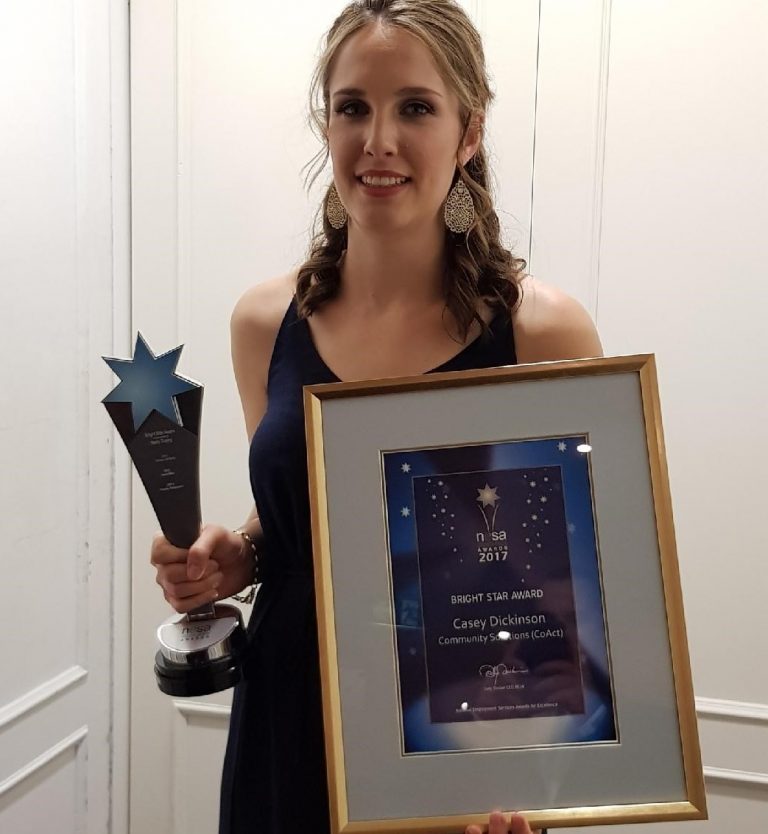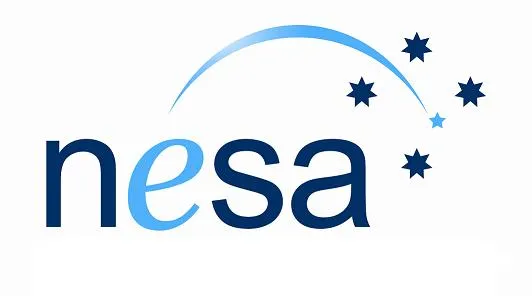
Casey Dickinson
Community Solutions Cannonvale
“Imagine how good you would feel and how good they would feel If you can help change people’s lives and give them a second chance?”
NESA Award Winner – 2017 Bright Star
Firstly Casey, congratulations on being NESA’s 2017 Bright Star. What was it like accepting the award in front of all those people?
Mixed emotions – very nerve racking as I do not do ‘spotlight or speeches’. But it was also such an honour to be recognised for this award and to be representing our 5 Star team for the Whitsundays. To have been given this opportunity was unbelievable.
Tell us a bit about yourself Casey. What did you do before joining the sector and how did you come to be an employment services consultant?
I never knew what I wanted to do as most of my family have been in the police force or health services, etc.
I would have loved to have done something like this however I could not handle the deaths, crashes, etc. I was working everywhere and anywhere. I then commenced employment with Shirtfront Solutions (uniforms, screen printing & embroidery) as an admin all-rounder. I was there for two years, when I realised I needed something more challenging and that I wanted to be able to help people.
I had no idea what an employment provider was or what they did, but I was intrigued and did research. Community Solutions advertised and I got an Interview. This is where it all started.
Let’s explore that a bit more. What skills and attributes did you have that made you think you’d be a good fit for an EC role?
My main qualifications were a driver’s license and all of my knowledge of computers and people.
To me, most qualifications are just a piece of paper – it’s ‘on the job’ experience that gets you the information. I had a Cert 3 in Childcare and Hospitality, and did all these extra non accredited courses. Have I used them? No – because my heart wasn’t in any of these jobs.
I am passionate about caring and helping people, I believe people can change but they also have to want to help themselves. Some clients just have their whole world fall apart and they need help to glue it back together. We are all human and deserve to have respect and a second chance.
At the start I was thinking: ‘Wow, I was brought up in an extremely good home compared to some, and that some people live the way they do because they have never been educated or had that person they can call on and ask what to do when they get an interview’.
It was very hard to get started as there was so much to the job, with compliance, job plans, Work for the Dole, re-educating job seekers, guidelines and procedures. To be able to change someone’s life to get them a job or interview clothing and become an adult, to be a true part of our community and a person that clients can trust and be inspired by is truly what keeps you pushing yourself to that 110%.
Tell me about the Cannonvale site. It was a 2-star site, you find yourself the only EC with a caseload of around 240 , and it becomes a 5 star site. Easy question – how did you do it?
I can’t give away all my secrets! I can tell you it takes a lot of dedication, determination, trial and error, and listening to your clients instead of beating them constantly with compliance. You’ve got to be fair but firm.
You’ve also got to remind them that you will help them only if they want help – they have to do these things for themselves.
I get a lot of support from my team and the people around me and I have an encouraging, supportive and very driven boss.
At the end of the day we are all in it for the same prize and that’s the numbers, the outcomes, the good news stories and the stars.
Tell us a bit more about yourself Casey. What do you like doing when you’re not working?
I go to Crossfit, which is something I love as it helps with my own mental health: it’s a team, its motivation and determination and I get to be fit. I also enjoy gardening and renovation/DIY.
What’s the best thing about your job Casey…and what’s the hardest part?
The best part is helping people – helping clients achieve things. It might be a resume, interview and interview clothing, job applications, getting people into work and keeping them there. The best part is changing people lives.
The hardest part are the clients that are so unwell and need professional help: the mental health issues, and the people with addiction. It’s so simple for me to see what they need to do, but it’s so hard for them.
I also see people that ride the system – they know how it works and continue to be on Centrelink for their whole lives.
I guess that one issue with regional areas is that some people tend to stay on the caseload for long periods. How do you keep them engaged, or re-engage them?
Sometimes it about telling them how long they have been on the system – wearing your detective hat and making sure their stories marry up.
We get them engaged in our Master Class & Work Connections so they are in here each week actively looking for work, applying for jobs updating their resume etc.
We get them to write a list of 10 places that they would like to work and what they want to do, so if we get those interviews and they turn it down they can’t say we did not try.
But at the same time you may have someone on the system that has also been telling people for the last five or so years what has happened to them and no one has actioned this, so we need to get medical evidence from their GP and help them get reassessed by Centrelink, as each individual deserves a service that is going to help them.
Cyclone Debbie struck the region in March 2017. I know that a number of resorts have had to close down which means a lot of people with specialist skills are put out of work. How are they when they come in to see you, and what sort of support can you offer them?
The Whitsundays is a caring community and everyone pitches in. People and businesses have helped everyone out: people take people in, food deliveries, labouring…
We’ve been able to get a lot of people work – it may not be their profession or what they were doing but it’s a job for them and it gets the bills paid.
We had to remind all clients to apply for the government grants and assistance and help them to do this – and encourage them to ask questions.
We have been able to refer people to ‘FREE’ counselling sessions/ workshops that businesses from the community have put together.
We have been referring them to the Neighbourhood Centre for food and housing furniture assistance, and we’ve been able to refer them to the Community Service Recovery.
We have had more resources than ever to use which has been great and very helpful.
There has also been a lot more JOBS, so we have been marketing, referring and placing people into work.
I also know that you helped a young feller who went through a real hard time – he had hurt himself at work and really struggled with mental health for a while. How did you help him go from so far down back into stable employment?
A brief outline: He struggled with day to day life, his mental health, and drug and alcohol addiction.
We got him some counselling and health maintenance with his GP, however this was a work-in-progress as he had a big ‘wall’ up with many issues.
We started Work Connections & Master Class, he had been working as an electrician but was injured in the last job – so didn’t want to return to that type of work.
We then started with diet & exercise, interview clothing and techniques to build confidence and booked in some interviews.
Our Work Force Solutions consultant Lesley assisted with the job interviews and before we knew it he was taken on by a boating company, doing small electrical/ labouring work for a few hours a day. We called him every morning to make sure he was awake and ready for work and that he could get there on time. We would also ring him at night to see how his day was and if there is anything that he needed.
He felt what it was like to have control and an income back again. He became completely clean of drugs and alcohol and stayed in the same job for a few months until he then wanted more hours and got a full time job as an electrician again.
It was extremely hard but very rewarding as he is clean and is still working full time. He had a lot of barriers but we had to show him as much support as we could and reassure him that he was okay, doing the right thing and improving.
Finally Casey, if a person was considering a career in the employment services sector, what advice would you give him or her?
Don’t treat it as ‘just a job’. If your heart is not in it, then don’t do it.
You really have to want to help people. We are dealing with people’s lives and their health and wellbeing. You do see the addicts, the clients out of jail, the family breakups/ divorces, and the people that don’t want to work – these are your biggest challenges.
Imagine how good you would feel and how good they would feel If you can help change these people’s lives and give them a second chance? It’s a very rewarding job.

